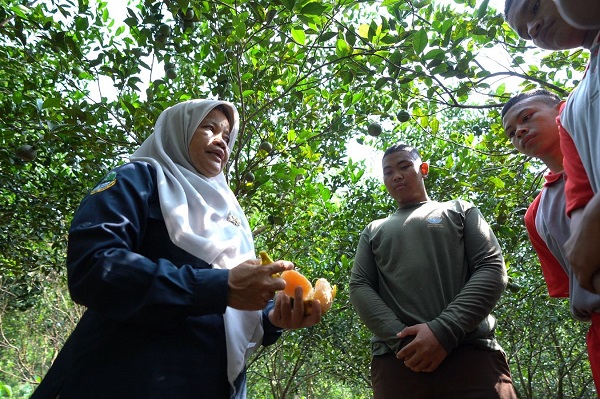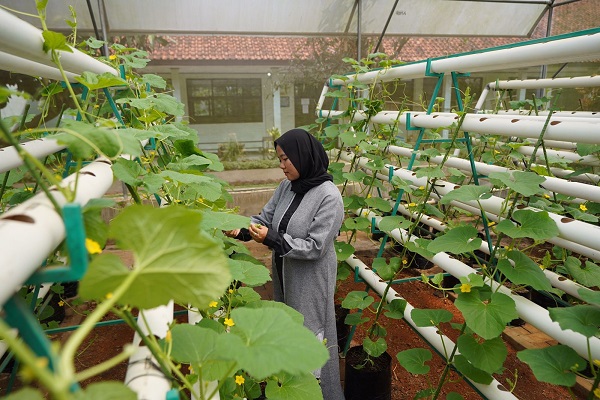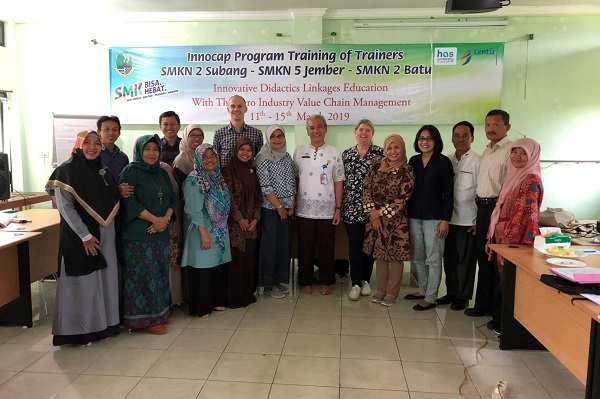Indonesia is an agricultural country where most of the people work as farmers. The quality of human resources (HR) in agriculture can be strengthened through education at the vocational school (SMK) level.
To prepare the younger generation of food producers for the agricultural challenges of tomorrow, Indonesia’s Ministry of Education, Culture, Research, and Technology (Kemendibukristek) is working with the Dutch Orange Knowledge Programme (OKP) on the revitalization of vocational education.
Starting in 2018, HollandDoor coordinated three Nuffic-funded OKP programs in Indonesia on behalf of six Dutch consortium partners: HAS Green Academy, Wageningen University & Research, Van Hall Larenstein, Zone.college, Yuverta, and Lentiz. Through their involvement in different programs, these institutions actively supported the revitalization of Technical and Vocational Education and Training (TVET) in the Indonesian Agricultural Sector.
The Indonesian partners were University of Malang, BBPPMPV Cianjur, and IPB Bogor. During the program, 16 SMKs were involved as a recipient.
From 2018 to 2020, one of the recipients was SMKN 2 Subang, West Java.
What were the results at SMKN 2 Subang?
Three years after the first Nuffic-funded OKP program ended, the head of SMKN 2 Subang, Ramlis, gave an interview commending the collaboration between the Netherlands and Indonesia. In his assessment, the joint effort has had a significant impact on the development of SMKN 2 Subang, especially in the agricultural sector.
“This collaboration included four pillars: institutions, curriculum development, increasing the competence of educators and education, and infrastructure development. The positive impact of the collaboration on SMKN 2 Subang has been considerable. We received assistance for two periods, with funds being spent on programs that advance our progress across each of the four pillars,” said Ramlis.
One of the key learnings for SMKN 2 Subang was related to project-based learning (PBL).
The person in charge of cooperation from SMKN 2 Subang, Eti Rohayati, said these training sessions strengthened the innovation capabilities of everyone at SMKN 2 Subang.
“During the PBL sessions, students were taught how to make, process, package, and market a product. This mind-opening experience gave students the chance to practice their skills directly and make products that can be sold immediately. Indirectly, the students also learnt valuable entrepreneurship skills,” said Eti.
The products developed by the agriculture sector at SMKN 2 Subang are then marketed to the surrounding community, schools, and supermarkets in West Java Province and beyond. The PBL sessions also teached SMKN 2 Subang students to make products that have sales value.
The impact of this program is far reaching. Not only has it increased the number of products being built; it has also improved the performance of the students. Several SMKN2 Subang students were able to join a study tour to the Netherlands, financed by the Dutch Government, via another program. According to alumni, this opportunity is greatly beneficial.
Call to action:
To prepare and inspire a new generation of employees and entrepreneurs for a career in the agricultural sector, investment in vocational education is extremely important.
HollandDoor, invites governmental departments, educational organizations and private sector organizations to contact us and find out more about the experience and expertise we can offer in strengthening the AgriFood sector.
For more information, please contact Engelie Beenen.






